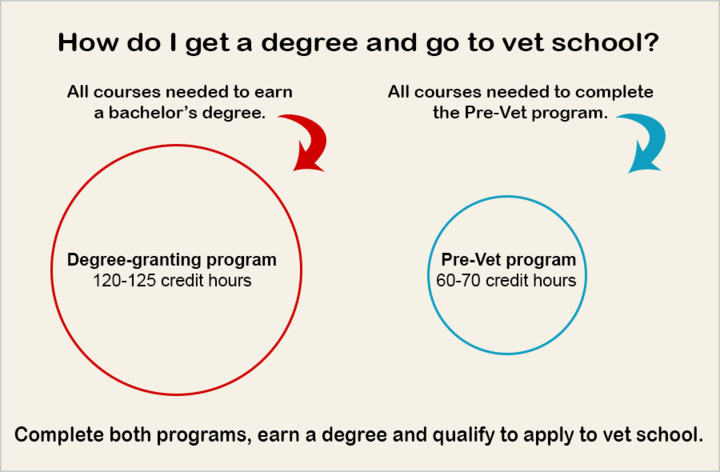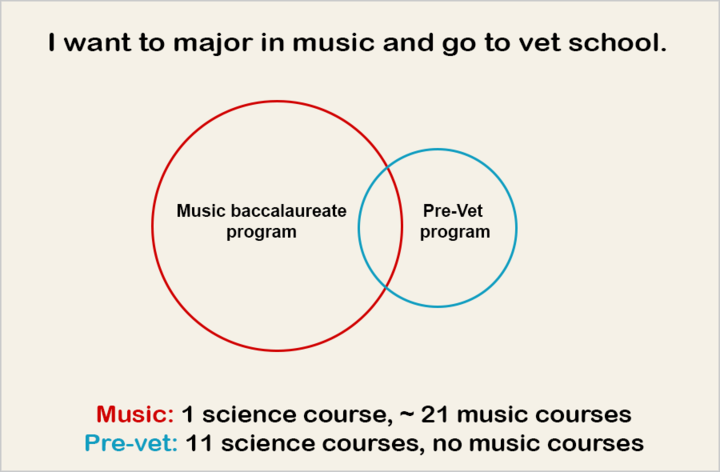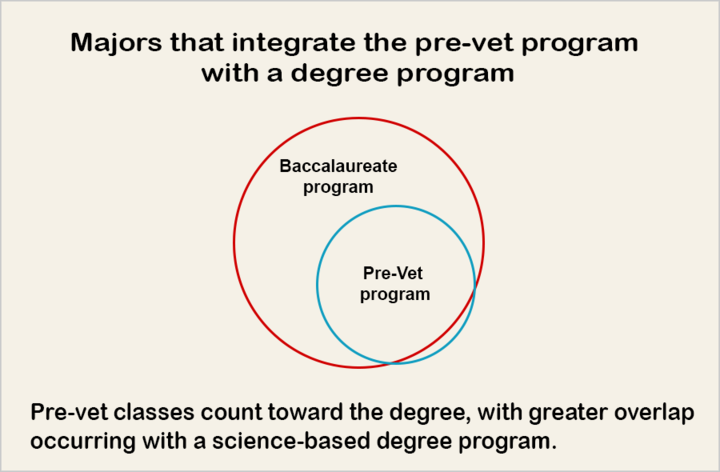The path to veterinary school
Every veterinary school establishes the college course requirements needed to qualify for admission to its DVM program. These courses are referred to as "pre-vet requirements." Pre-vet requirements vary and comprise about half the credit hours required for a bachelor's degree. For this reason, there is no bachelor's degree in pre-vet. This gives you an opportunity to earn a degree whatever subject interests you. Veterinary school selection committees don't care what your degree is in as long as you meet the pre-vet requirements.
Although there is no bachelor’s degree in pre-vet, the program allows you to be advised from the beginning by people who specialize in advising for veterinary school. Since vet schools don’t care what subject your degree is in (and they really DON’T care!), you can select any one of the many majors at the University of Nebraska–Lincoln. Your pre-vet adviser will work with you to determine which bachelor’s degree program will best match your interests, talents, and career goals. You have as long as the first two years in the pre-vet program before you have to decide which degree program you want to pursue, so you don’t have to decide today.
Pre-Vet and Degree Program
Every veterinary school establishes the college course requirements needed to qualify for admission to its DVM program. These courses are referred to as "pre-vet requirements." Pre-vet requirements vary and comprise about half the credit hours required for a bachelor's degree. For this reason, there is no bachelor's degree in pre-vet. This gives you an opportunity to earn a degree whatever subject interests you. Veterinary school selection committees don't care what your degree is in as long as you meet the pre-vet requirements.
Although there is no bachelor’s degree in pre-vet, the program allows you to be advised from the beginning by people who specialize in advising for veterinary school. Since vet schools don’t care what subject your degree is in (and they really DON’T care!), you can select any one of the many majors at the University of Nebraska–Lincoln. Your pre-vet adviser will work with you to determine which bachelor’s degree program will best match your interests, talents, and career goals. You have as long as the first two years in the pre-vet program before you have to decide which degree program you want to pursue, so you don’t have to decide today.



What are the most-selected degree programs for students who want to go to vet school? Here are a few of the most popular. To learn more about each one, go to Nebraska Admissions and search the alphabetical list of majors.
- Animal Science
- Veterinary Science
- Fisheries & Wildlife
- Biochemistry
- Forensic Science
Preparation beyond your degree program
Admission to vet school is competitive, and you’ll want to do everything you can to set yourself apart. Veterinary schools evaluate applicants in three areas:
- Academic Preparation—Courses and grades
- Career Exploration—Shadowing/working with a veterinarian
- Leadership Development—Involvement in clubs and organizations
An easy way to remember the three components is to think A-C-L.
Preparation in each A-C-L area usually begins in high school (A-C-L: Keys to admission has tips and hints for you) and continues in college. Your pre-vet adviser will help you develop a strategy.